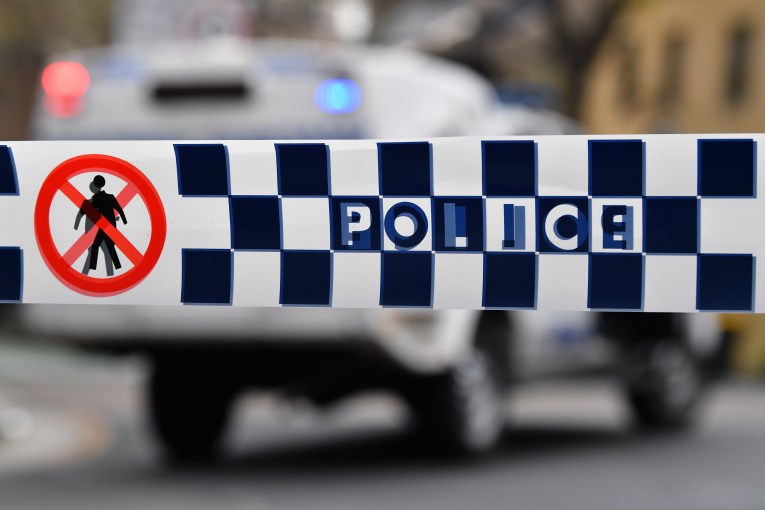Kathleen Folbigg was in disbelief and smiling broadly as she stepped out of a white prison van in her first moments as a free woman after 20 years in jail.
Prison guards drove Ms Folbigg from Clarence Correctional Centre, in Grafton, to the farm of her childhood friend and staunch supporter Tracy Chapman.
The sprawling property on the NSW mid-north coast will be her new home after she was on Monday pardoned for the deaths of her four children.
Ms Folbigg, once dubbed Australia’s worst female serial killer, said she couldn’t believe it as she drank in the green surrounds and fresh air.
“I am so elated it’s not funny, I’m nervous and I’m everything,” said Ms Folbigg to a 9News crew.
“What are you going to do now?” asked the journalist.
“I dunno, I need a drink of water. I don’t know about anything else.
I’m still like, ‘Is this happening’, I’m like ‘Oh my God’.”
Ms Folbigg and Ms Chapman, who had rallied for her throughout the years, held each other in a long and tight embrace.
Wearing red pants and a beige top, Ms Folbigg carried only a pair of sneakers in her hand.
Her supporters said justice had been done and Ms Folbigg was “beyond happy”.
Ms Folbigg was jailed in 2003 after a seven-week jury trial found her guilty of three counts of murder and one of manslaughter over the deaths of her babies Caleb, Patrick, Sarah and Laura between 1989 and 1999.
She was sentenced to 40 years in prison, with the term later reduced on appeal to 30 years with a minimum of 25.

Kathleen Folbigg and staunch supporter Tracy Chapman on Monday. Photo: 9News
Before arriving at the rural home of Ms Chapman, her lifelong mate and fierce advocate, a joyful Folbigg thanked her supporters in a separate video aired by the Seven Network.
“I can’t thank everybody enough for all of the support and all of the hard work that has gone into this moment,” she said from the town of Glenreagh, south of Grafton.
“I’m beyond happy, it’s ridiculous. I’m in shock, so thank you.”
Ms Folbigg will stay at Ms Chapman’s property, an animal therapy farm, over the coming days.
Greens MP and supporter Sue Higginson was one of the first to reveal Ms Folbigg had been released from Clarence Correctional Centre in Grafton.
“She’s walking, she’s outside, she’s in the sunshine … justice has been done,” she said.
The polarising case had been hotly debated in the weeks leading up Ms Folbigg’s release. A fresh inquiry heard credible evidence her children may have died of natural causes.

Kathleen Folbigg was nervous, excited and in disbelief. Photo: 9News
Compensation club
Kathleen Folbigg may soon join an unenviable club – Australians awarded a seven-figure sum after wrongful conviction for murder.
Just as Lindy Chamberlain adamantly protested her innocence, the former Hunter Valley hospitality worker had always denied responsibility for the deaths of Caleb, Patrick, Sarah and Laura, who were all under the age of two when they died between 1989 and 1999.
She faces the prospect of joining a select few in Australia, including Ms Chamberlain, in being awarded seven-figure sums after their wrongful convictions.
Ms Higginson, who championed Ms Folbigg’s pardon in the NSW parliament, indicated the former prisoner would seek compensation or an “ex gratia payment of some sort”.
“Whatever that sum looks like, may it be the biggest sum that we can imagine,” she said on Monday.
Robyn Blewer, director of the Griffith University Innocence Project, pointed to two recent cases to indicate how Folbigg could be compensated for her 7300 days in jail.
In May, Western Australian man Scott Austic received $1.3 million on top of an earlier payment of $250,000 after serving nearly 13 years for murdering his pregnant secret lover.
He’d sought $8.5 million after being acquitted in 2020 on appeal. Both payments were ex gratia (meaning no liability was admitted by the Crown).
In another case, David Eastman was awarded $7 million in damages by the ACT Supreme Court in 2019.
Mr Eastman served almost 19 years over the 1989 shooting murder of federal police assistant commissioner Colin Winchester, only to be acquitted at a second trial.
“The difference is it was in ACT, which has a human rights act, and under that there is an entitlement for compensation under human rights,” Dr Blewer said.
“Mr Eastman was then able to sue because there was a right to compensation.
“The court assessed his damages in the same way they would a tort … the court went through every time he was injured.”
Like Mr Austic, Ms Chamberlain was awarded an ex gratia or grace payment. The $1.3 million awarded in 1992 now equates to about $3 million.
Given NSW lacks a human rights act like that of the ACT, Ms Folbigg will need specific legal advice about whether a civil claim is possible.
Dr Blewer said she could end up reliant on what the government is willing to pay.
“Twenty years is a substantial amount of time lost,” she said.
“It might depend on the good grace of the NSW government.”
Before that bridge can be crossed, Ms Folbigg’s lawyers will await the final report of former NSW chief justice Tom Bathurst into her convictions. An application to the NSW Court of Criminal Appeal to quash her convictions is likely to follow shortly afterwards.
Talk of compensation was dismissed on Monday both by Attorney-General Michael Daley, on whose advice the governor pardoned Ms Folbigg, and his predecessor Mark Speakman, who initiated the inquiry.
“That’s getting well ahead … of today’s story,” Mr Daley said.








